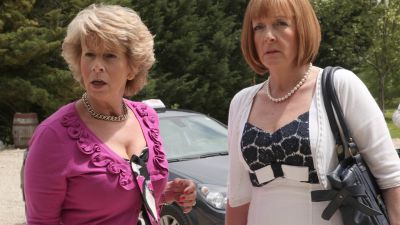Wallsend's Emmerdale star Charlie Hardwick speaks about working class struggle to access the arts

Actor Charlie Hardwick has advised "kids to keep at it" as recent Office for National Statistics (ONS) figures revealed the proportion of working class actors, musicians and writers has shrunk by half since the 1970s.
Ms Hardwick played the role of Val Pollard in ITV's long-running soap, Emmerdale, from 2004-2015, winning a best comedy performance award at the British Soap Awards in 2006.
However, she said she never dreamed she could pursue a performance career because of her North East background and working class roots.
She said: "I didn't think I could be an actor. End of story. I had no drama provision at school. There was nowt."
Charlie Hardwick sat down with ITV News Tyne Tees presenter Ian Payne
The ONS found 16.4% of creative workers born between 1953 and 1962 were from a working class background and being born in 1960, Ms Hardwick was one of them.
Four decades later, that number has fallen to just 7.9%.
Ms Hardwick cites numerous reasons for such a dramatic decline.
She said: "There's been austerity, then there was Covid which flattened everything and now there is a cost-of-living crisis and the first thing that goes is money to the arts."
Authors of the Freelancers in the Dark research project, theatre maker, Holly Maples and Newcastle University Associate lecturer, Allie Young, explored the pandemic’s impact on working class artists.
They found that 70% of those who identify as being from a socio-economically disadvantaged background have changed or completely changed their expectations about their future work since March 2020 (compared to 55.4% of those from other backgrounds).
Meanwhile, community-led campaign group, Freelancers Make Theatre Work ( FMTW ) recently conducted its second big Freelancer Survey in 2022 entitled 'Open to all, but not open all hours - hopes and fears of the future of the UK's entertainment industries.'
FMTW found those from working class backgrounds were disproportionately concerned about job security, safety at work, harassment and discrimination with working class background freelancers highlighting precarity as a major barrier to entering and remaining in the industry.
Ms Hardwick reflected on very different times when she started out in her career crediting Newcastle City Council and youth theatres for "enabling" her to succeed pursuing a successful show-business career.
The 62-year-old actor said: "When I started, I didn't even know that I could become an actor and without the political will of Newcastle City Council and the adult education budget who set up youth theatres on street corners to try and make the arts accessible to working class kids, I would never have even gone into this business at all.
"The council put their money where their mouth was and they believed in giving working class kids a chance to develop, explore, experiment and perhaps go into the industry."
She continued: "We're talking about a class ceiling here, aren't we?"
"I don't know what would have happened to me had I not had the opportunity to express myself through the arts. I think I would have been a terrible civil servant where I started off."
"When I left the youth theatre it was a thriving arts industry. Live Theatre I've worked at for 30 years. There were theatre companies that supported all of these young people coming out of the youth theatres."
"I think independent schools still maintain fantastic provision for drama and the arts in their schools because it's deemed to be important."
Ms Hardwick still believes there is a "huge diverse industry for performers."
She said: "Open Clasp Theatre Company in Newcastle has just trained Cleveland Police in coercive control with working class writers and working class actors working with the police."
She added: "I'd like to thank the people that helped me and enabled me to make my way in life through drama. I've loved it."
Ms Hardwick issued advice to those from working class backgrounds starting out in their creative careers and said: "Keep at it kids!"
A spokesperson for Arts Council, England said: We always strive to be more inclusive. We are encouraging applicants from lower socio-economic backgrounds to apply for our funding and we expect the organisations we fund to do more to reach under-represented communities.
"We know there’s more to be done though, that’s why we’ve identified 54 priority places in England where, historically, public investment in creativity and culture has been low, to help us achieve a fairer spread of investment across the country."
Listen to Unscripted - the ITV News arts and entertainment podcast